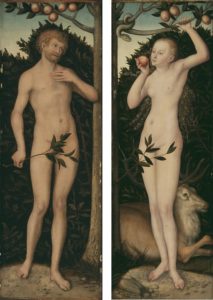by Rev. Paul Doellinger
A key teaching of the Reformation is Luther’s understanding of the three estates established and instituted by God: the church, the home, and the state.[1] Already before the fall into sin God established the Church and the home. With His Word God spoke His creation into existence. With that same creative Word God established and preserved divine worship and married life for Adam and Eve. The Word of God was the center of worship and life together for God’s most beloved and unique creatures in Paradise.
Read Genesis 2.
- Created in the image and likeness of God, man and woman are unique and distinct from the rest of creation (Gen. 1:27). “The Divine Majesty speaks to man alone and man alone apprehends God…Our state is better. We hear God, know His will, and called into a sure hope of immortality.”[2] How does God address and speak to us in a different way than He does all other creatures?
- Commenting on the institution of the Sabbath Day in Genesis 2:3, Luther states, “The Sabbath was not ordained for sheep and cows but for men, that in them the knowledge of God might be developed and increased…On the seventh day [God] wanted men to busy themselves with both His Word and with the other forms of worship established by Him.” [3] Since in the New Testament we are not commanded to worship on a certain day, how are we to regard God’s commandment to “Remember the Sabbath Day by keeping it holy?” What, then, is the purpose of divine worship?

3. God placed the tree of life and the tree of the knowledge of good and evil in the midst of paradise (Genesis 2:9). Luther calls this tree, “Adam’s church, altar, and pulpit. Here he was to yield to God the obedience he owed, give recognition to the Word and will of God, give thanks to God, and call upon God for aid against temptation.” [4] What physical or external forms of worship has God given to His Church today? Why, like Adam, should we give recognition to the external means to which God has attached His Word?
- “The church was established first because God wants to show…that man was created for another purpose than the rest of the living beings. Because the church is established by the Word of God, it is certain that man was created for an immortal and spiritual life…[The command of God to Adam not to eat from the tree of the knowledge of good and evil was]…”the Lord preaching to Adam and setting the Word before him.”[5] What is the central thing in the worship of the Church?
- In Genesis 2:18, after the estate of the Church is established, God establishes the household, as Luther notes: “We have the Church established by the Word and a distinct form of worship. There was no need of civil government, since nature was unimpaired and without sin. Now also the household is set up. For God makes a husband of lonely Adam and joins Him to a wife, who was needed to bring about the increase of the human race…Is it not a great thing that even in the state of innocence God ordained and instituted marriage?…This comfort stands against all the doctrines of demons (1 Tim. 4:1), namely, that marriage is a divine kind of life established by God Himself.” [6] In a world that continually assaults and redefines marriage, where can we find our certainty and comfort?
- On Genesis 2:22 Luther states, “Let us, therefore, obey the Word of God and recognize our wives as a building from God. Not only is the house built through them by procreation and other services that are necessary in a household; but the husbands themselves are built up through them, because wives are, as it were, a nest and dwelling place where husbands can go to spend their time and dwell with joy.” [7] What is the role of man and woman within a marriage? How does God’s Word in Genesis two inform the way we esteem marriage and the household?

In the state of innocence Adam and Eve enjoyed life in perfect fellowship and communion with God. God established the Church by setting His Word before them. He established the household by joining them together as husband and wife. Even though we have fallen into sin, we are still given to live in and enjoy these estates of God, the church and the household. Sin certainly corrupts and tarnishes these estates, which is why schisms and troubles in the Church and home abound.
Nevertheless, God is merciful and compassionate. He still sets His Word before us. He still sends His Holy Spirit, Who preaches the Gospel of salvation into our ears and presents to us our Lord Jesus, who has rescued us from sin, death, and hell by His death and resurrection, and granting to us the forgiveness of sins. Indeed, Christ our Lord has restored the blessed estates of church and home by reconciling us back to the Father and making us to be His holy and precious Bride, the Church (Ephesians 5:22-33). God also by His Word and ordering places us into marriages and homes where we can live and love and serve our nearest neighbors. May the Lord continue to bless our Church and our homes with His Divine Word, which is the greatest treasure we have!
The Rev. Paul M. Doellinger is pastor of St. Paul Lutheran Church, Cassopolis, Mich.
[1] For a fuller description of this see Luther’s “Great Confession Concerning the Lord’s Supper.” [Luther, Martin. Luther’s Works, vol. 37: Word and Sacrament III (J. J. Pelikan, C. Oswald, and H. T. Lehmann, Eds.). Philadelphia: Fortress Press, 1999., pgs. 364-365.]
[2] Luther, Martin. Luther’s Works, vol. 1: Lectures on Genesis Chapters 1-5 (J. J. Pelikan, Ed.). Saint Louis: Concordia Publishing House, 1958., pg. 81
[3] Ibid., pg. 80
[4] Ibid., pg. 95
[5] Ibid., pg. 104-105
[6] Ibid., pgs. 115, 134
[7] Ibid., pg. 134